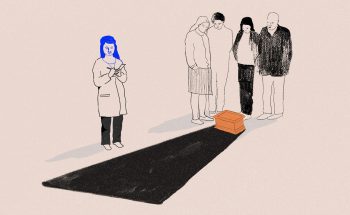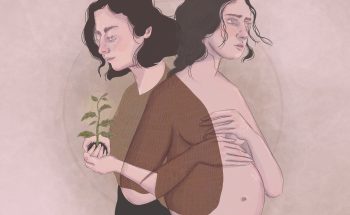
Translation: Postcard from San Francisco
Share:
Daniel Alarcón: Thanks for listening to Radio Ambulante. I want to tell you about a new show on NPR, a new way to keep up with the day’s news. It’s called “Up First”. In 10 minutes, give or take, you can get a sense of the important news stories of the day. Those things you really need to know. Start your day with “Up First”, available Monday through Friday at 6am, on NPR One or any podcast app.
Daniel: Welcome to Radio Ambulante, from NPR. I’m Daniel Alarcón. Now that we are part of NPR we want to share some of our favorite stories with our new audience.
Today we’re sharing two stories from San Francisco, California. The first one is told by a friend of the show, Deldelp Medina.
Deldelp Medina: To tell this story, I need help from my mom…
Delfina Bernal: I am Delfina Bernal, a Colombian artist, naturalized in the United States. I’ve lived in California since 1981. July of ‘81.
Deldelp: I came to San Francisco with her and my stepfather, David. He was American and a little bit of a hippie. I had just turned 8 years old. We came from Barranquilla, Colombia, a hot Caribbean city. Until this moment, my childhood had consisted of jumping around from city to city, country to country. We came to San Francisco trying to create the stability I hadn’t known yet.
I remember that, although it was supposedly summer, it was really cold and there was a lot of fog. I remember that in the taxi going to the house, I fell asleep, and I almost fell over when the car went uphill. That’ how steep the streets were. That was my first impression of San Francisco. And my mom…
Delfina: Here was this tiny city, it was cold all the time, and I didn’t know anyone either. I didn’t like anything. I was disoriented, it was like I was out of place.
Deldelp: Exactly. Out of place. And I, at eight, felt the same way.
We came to live in the Castro. And despite how grey the rest of the city was, Castro looked more like Barranquilla. In the early 80’s the neighborhood was a party, with lots of movement, with lots of commotion. There were clubs where people danced until dawn, and an almost tropical feel. I liked the neighborhood. I liked that the neighbors always said nice things to me. What a beautiful girl. How nicely dressed.
But I didn’t like one thing: there weren’t many kids there, and I didn’t have anyone to play with. Most of my neighbors were young men, pretty much all of them really.
Delfina: The look of the moment was…very tight jeans, very fitted, young men, with their hair very short, and they looked healthy, among other things. Most of them were very handsome. It’s the truth. The men were very handsome. The women though were ugly. I thought those women were so ugly…
Deldelp: My mom…well she’s always been very…direct
But part of what she says is true. The men were beautiful. Castro Clones, they called them, because they all looked alike. At school, when my classmates found out where we lived, they asked me if my stepfather was gay, and I, completely oblivious, answered that I didn’t know, that I would find out.
My family, the ones who stayed in Colombia, with their prejudices, worried a lot about us living there.
Delfina: “Oh, you all are in it! You’re living there in the thick of it all the time!” But I said, “what are you talking about? What ruckus?” –“Yes, everyone is gay in San Francisco, and you’re all in the middle of it!”
Deldelp: This thing that the prejudiced called ruckus, we liked. It was a euphemism, of course. With ruckus my aunt meant the liberal atmosphere of the neighborhood. She imagined men fondling each other and making out on the corners. But in reality they were very discreet and I never saw much of this.
My neighbors, especially, were sweet. One was tall, and he worked in a bank. The other one, shorter, sold paintings in a store. Careful and refined, they had parties all the time and I listened through the wooden walls that separated our houses.
We weren’t intimate friends, but we got along well. And both times my mom lost her keys, they let her go through their house and jump the fence. And she was fascinated by what she saw, something very different from the chaos that reigned in our house.
Delfina: I was embarrassed… The shorter one already had dinner prepared, the table was set, with carefully placed artichokes. And he came to our garden to steal flowers to make bouquets for his house.
Deldelp: Life in Castro had the same rhythms of any other neighborhood.
Delfina: During the week, the tall one was dressed up in a suit and everything, with a tie…And the other one… he dressed normal. And on the weekends, both of them dressed in leather, and they went out with their leather pants.
Deldelp: To have a good time, I imagined, in the bars and clubs throughout the neighborhood. But it was also a neighborhood of small stores, flower shops and bookstores that I visited often. This was where I found comics from the 40’s and 50’s, bought dried flowers and used books with my few cents.
How do say this?…The Castro became my neighborhood.
The same month that we arrived in the United States, July of 1981, news appeared for the first time in the press about an illness that didn’t yet have a name. This article, from the New York Times: “Rare cancer seen among homosexuals.” It says, “cause: unknown.”
And the epicenter of this new plague was the Castro.
When I turned 10 my parents bought a camera for me. A Kodak 110.
From then on, I brought it everywhere with me. It was 1983. And the neighborhood was changing. I went all over the city by myself. And I took pictures of the streets. Of buildings, mostly. I loved those Victorian houses that had survived the 1906 earthquake. I preferred taking pictures without people. I don’t know why, but now I see it as if it had been a premonition.
Deldelp: When was the first time you heard the word AIDS?
Delfina: Well, AIDS. I think it was when we went to the pharmacy.
Deldelp: My mom is referring to the neighborhood’s corner pharmacy. One day they put up some posters in the window.
Delfina: Color photocopies…or something like that…with these spots that had appeared on people’s skin. So, they were asking if people knew what this was.
Deldelp: No one could explain it, but now it wasn’t possible to deny that our neighbors were sick. The fashionable men that always walked around with tight short-sleeve shirts, without caring about the weather…these same men who always showed off their amazing bodies…now they walked around in long sleeved shirts…and later in sweaters with turtlenecks.
This was how you knew they were sick. They changed how they dressed.
And our neighbors did too.
Soon it wasn’t the tropical, happy neighborhood anymore, the one we had come to only two years before.
One day, the family of one of the neighbors came. I don’t remember which one it was, the tall one or the short one, the banker or the painter, that was dying. Perhaps both. I just remember that some family members came, and they took their things.
I never saw them again. And they weren’t the only ones. Many more left. Me, at 10 years old, couldn’t help noticing. It was as if the lights went out in my neighborhood, house by house, street by street.
Daniel: Deldelp Medina lives in San Francisco. In 2012 she founded Code2040, a nonprofit organization that creates opportunities in technological innovation for Latino and African American communities.
We will be back after a short break…
—
Linda Holmes: Summer movie season gets louder and longer every year. I’m Linda Holmes. For a guide through the blockbusters you know about and the surprise bright spots you may not, Pop Culture Happy Hour has you covered. We’ll tell you what we are looking forward to, what we’re secretly dreading, and what just might sneak up on all of us. Find Pop Culture Happy Hour on the NPR One app or wherever you get podcasts.
—
Daniel: We’re back. I’m Daniel Alarcón. Today we’re dedicating the show to San Francisco, the city where Radio Ambulante was founded. Our second story starts with this woman…
Yadira: I always pray to God to bring Javier back. Bring him back.
Daniel: Yadira had been married to Javier for ten years, living in San Francisco, California, with their two kids, when something changed in their marriage…basically, little by little, Javier disappeared.
Yadira: I know I won’t be able to bring Javier back. But, that’s why I say that, he’s something special in my life. Something special I will always remember…and I am going to be proud and thankful because the time I’ve been here he helped me alot. But now he’s gone.
Yadira: Yes, Javier left, in an unexpected way. And when Javier left, someone replaced him…
Lucía: My name is…my name is Lucía Pérez.
Daniel: Javier is now called Lucía. He is Lucía. And this is how he describes the person he used to be.
Lucía: I was a person created by society, like a character created for a movie, or by family, or by people around me. Javier was tired of living that role. Of playing that role in life. Until he said, that’s it. That’s enough.
Daniel: This story was researched by Rosa Ramírez, and produced by Nancy López. This is Nancy.
Nancy: For many years, Yadira took care of the kids at home and Javier worked as a security guard. They had – or appeared to have – a normal life. But that supposed normality was exactly what Javier felt as a burden, a load which every day became harder to bear. At the end of 2009, when the holiday season was approaching, Javier was very depressed. He needed to unburden with Yadira.
Yadira: December 24th he had just arrived home at night from his job. I had just woken up. And so…I was wearing my nightgown. Hair disheveled. I made myself a cup of coffee. He had brought some bread. I guess to sweeten the moment for me, right?
Lucia: I don’t know how much time passed before I said to Yadira, “Yadira I need to speak to you…”
Yadira: I said, “about what?”
Lucia: It took me an eternity to tell her what I was going through. I didn’t know how to tell her. I started crying and crying and crying. I didn’t know how to tell her.
Yadira: And he was giving me this elaborate explanation so I said: “to the point,” right?
Lucia: I saw she was very worried. I didn’t want to tell her, because I didn’t want to hurt her. And then I thought she may be thinking I was about to tell her I had another woman or I had slept with another woman. But I didn’t want her to think that – I sensed she was thinking that.
Yadira: And so…that’s when he told me he felt different. And I said, “Different. Why?” And he said, “I feel like I’m a woman.”
Lucia: Since my teenage years, since I was 13 years old, I felt I was a woman. And that I haven’t…I still feel I am a woman, and I don’t know what to do, but it’s something I can’t…I feel like a woman, and I have always desired to be with men.
Nancy: Since he was little, when he lived in Nicaragua, Javier would put a towel on his head, he would look in the mirror, imagining he had long hair. He dreamed of having a woman’s body. And as a teenager he started noticing men. This feeling had been with him always. But he never dared to share with others feeling like a woman. He was afraid of being rejected. So he decided to work harder at looking manlier. He started going to the gym, lifting weights to look muscular. He would go to parties and flirt with women. Later…he decided to marry Yadira, have kids and start a family with her.
Yadira: And I felt like a cold bucket of water fell on me. And I said, “he is messing with me. Since he doesn’t sleep well.” I thought, “the internet is driving him crazy.” And I didn’t believe him, honestly. I didn’t believe. I just didn’t digest it. I thought. “He’s crazy.”
Lucia: I started crying and so did Yadira, we cried a lot.
Yadira: Yes, I cried…a lot. I said, “this can’t be.”
Lucia: “Are you sure you feel that? What do you feel? Since when do you feel that? And why do you tell me now?”
Yadira: “I don’t know what to tell you.” Because I didn’t believe it was true.
Lucia: I didn’t know what to expect with Yadira and the kids. But I was sure she was going to grab her things, her bags, and leave for Mexico with the kids.
Nancy: But Yadira surprised him. She didn’t leave.
After that night, they continued living under the same roof. Every morning Javier would go to work, and Yadira would continue being in charge of the house and the kids.
Yadira: My mind was like no, it’s not true, no. For almost two years I kept thinking it was not true. “He’s crazy. He’s crazy.” And I would think, “What am I going to tell the kids? What am I going to do?”
Nancy: In the meantime, Javier started taking hormones, his breasts started to grow a bit and his voice started to change. Every day it became clearer to Yadira he did not live with a man, but with a woman. That’s when it became impossible for Yadira to deny it.
A while later, Yadira started being angry with Javier. She couldn’t understand – Why did Javier marry her if he felt he was a woman? She blamed him for ruining her life and that of their kids.
Yadira: At my son’s school last year the moms of my kids’ classmates would laugh at him. Their friends said his dad wears women’s clothes.
Nancy: But at the same time, Yadira missed Javier and she would get sad. She would sit and look at his photos and cry.
Yadira: And…I sat in the sofa and would look and look at him. And I would say to the photo, “What happened? Why are you like this? Why did you leave me so lonely? Why did you hurt my heart so much?” And I would say, “but one day you’ll come back.” And I’ve asked God to bring Javier back. Bring him back. But as time went by, I realized Javier was not coming back.
Nancy: By that time, Yadira stopped treating Javier as her husband. She didn’t wash his clothes or prepare his dinner, they stopped sleeping in the same bed. When they were out, Yadira would introduce Lucía as a friend, or a cousin, or sometimes as a tenant.
But Yadira never stopped caring for him…and she noticed how hard it was for Lucia to become a woman. Especially when they would go out.
Yadira: When I am in a bus with Lucia I see people looking at her like she’s a weird animal. Some make fun of her. I always tell her to walk with her head held up high. Never to be embarrassed of what she is.
Nancy: With time, Yadira and Lucia became friends.
Yadira: We watch novelas and have a cup of coffee with some bread. Lately we are cooking together….
Nancy: Maybe this closeness occurred because they lived as a couple for so many years, raising a family together. Or because, after all, Yadira was the person Lucia trusted the most.
Lucia: I talk to her about hair stuff, or shoes, or what women wear. Or even about men. But since she has been a woman all of her life, those things are not new to her. But since I am just becoming one, I observe more, and feel like a teenager.
Nancy: For Lucia a lot has changed since that night in December, but not in the way she expected.
Lucia: I am playing the role of a father. I have the same responsibilities now as I did before. So none of that has changed. The only thing that changed is that we are not having intimate relations, but we continue communicating the same way. We fight about the same things. Sometimes I even get confused. And sometimes I feel we are in the same situation we were before.
Nancy: When Lucia told Yadira her secret, she assumed she was going to lose her family. But it wasn’t like that. And maybe the most surprising part of this story is not that Javier wanted to become a woman, but that his family had been able to accept him.
Daniel: This story was researched by journalist Rosa Ramirez. She lives in Washington and works as a video producer for the Associated Press. The story was narrated and produced by Nancy Lopez, a producer at Snap Judgement, an excellent podcast from WNYC. Camila Segura edited this story. The sound design is by Martina Castro and Andrés Azpiri.
The rest of the Radio Ambulante team includes Desiree Bayonet, Andrea Betanzos, Melissa Montalvo, Caro Rolando, Barbara Sawhill, Ryan Sweikert, Luis Trelles, David Trujillo, Elsa Liliana Ulloa, Luis Fernando Vargas, and Silvia Viñas. Maytik Avirama is our editorial intern, and Carolina Guerrero is the CEO.
Radio Ambulante is produced and mixed on Hindenburg PRO.
Learn more about Radio Ambulante and this story on our website: radioambulante.org. Radio Ambulante tells stories of Latin America. I’m Daniel Alarcón. Thanks for listening.





